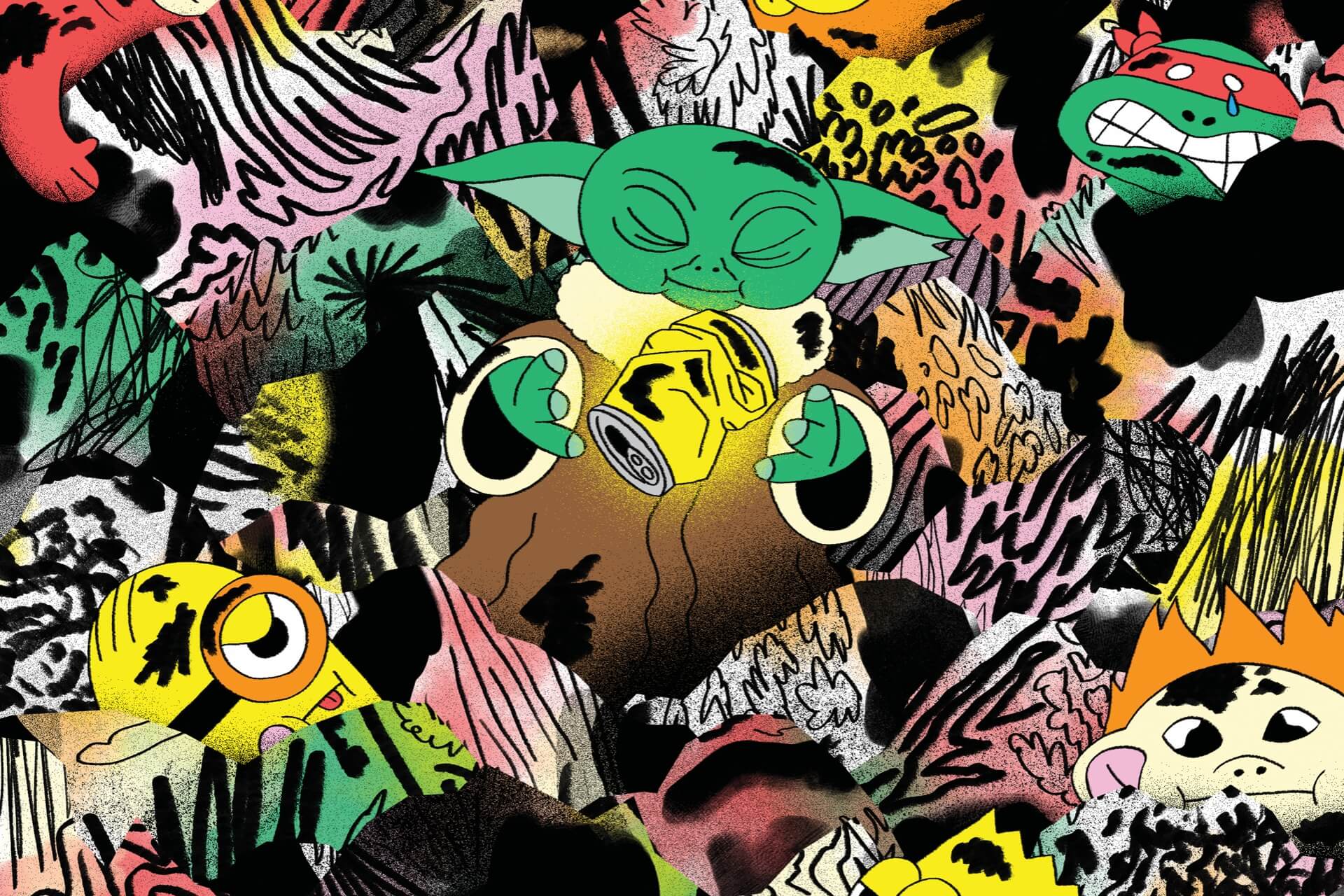May 31, 2022 Society
The pale-green, plastic face of Star Wars’ The Child has shiny black eyes, like obsidian orbs. The Child’s expression is indeterminable; it could be inquisitive or impassive, or show a chill Zen. Toy companies often target kids through their instinctive, evolutionary attraction to enlarged eyes, but The Child is next level, a petrochemical Buddha. In the Disney+ show Mandalorian, The Child is called Grogu, but at our place (as in many others), he is called Baby Yoda and has become both a charismatic symbol of hope and a plastic object that contributes to our planet’s destruction.
Like many people who don’t welcome ecological catastrophe, I try to be carbon conscious, but consumption-based resistance feels increasingly futile. I’ve stood paralysed in the supermarket, trying to figure out which brand of eco shampoo to use, or whether to drink oat or soy milk in my flat white. I’m an anxious person anyway, but this particular anxiety feels like a valid response to the existential dread at our warming planet. All of the decisions we make as consumers lead to varying degrees of environmental harm. Oat milk has lower carbon emissions, but soy milk uses less water. Soy contributes to deforestation in the Amazon, but oats are grown in monocultures that also use glyphosate-based pesticides. There is, it’s become clear, never a ‘no harm’ option.
My climate angst often relates to parenting my eight-year-old stepson. He is a mix of seamless kineticism and goofiness, an eloquent talker to random adults in parks who feels anxious about the fake stalactites at Auckland Museum falling onto the heads of visitors. We try to give him a sense of Aotearoa’s wild; days where he runs with our dog Lucy along the shoreline at Piha, captive to the drama of water and sky. We have a daily battle over screen time.
Parents have good cause for climate angst. A Science article on climate-related intergenerational inequalities suggests children born in 2020 will experience two to seven times more extreme weather events compared to those born in 1960, based on current climate policy. People in a UK-based organisation called ClimateStrike choose not to have children because of the impending climate crisis. Yet having kids is a powerful call to action. Talking to our kids about the climate must be the best chance we’ve got.
I gave the kid an illustrated book on climate-change warriors. I justified the purchase by telling myself it was a book he’d return to. He wasn’t interested. It sat in the unread end of his blue bookcase, next to Neil Gaiman’s Coraline, which he won’t read because the button eyes on the cover are too scary.
During lockdown, when I was supervising his school work and we were both feeling defeated, I told him he had to read a chapter of the climate book every day. He has watched so many David Attenborough documentaries that his imaginary games about sea habitats include words like ‘mating’. It can be embarrassing, but I am trying to be pro-science. But he doesn’t want to read the chapter about Attenborough. I say it is compulsory and what follows is an entirely drawn-out and fuming narration of Attenborough’s life story. Attenborough himself would choose a different profession.
Before Christmas, my stepson wrote a list — not for Santa, but for us — asking for a Baby Yoda. He was looking to correct our prior parenting fail — us giving him books, not toys, on his birthday. Teaching your kid to share feelings means they will be empowered to share their deep disappointment in you. He sobbed desperate tears into the grey couch in our damp concrete motel room, where we were staying because we were taking him to Hobbiton for his birthday. “Your birthday present is going to Hobbiton,” we explained, repeatedly. He kept crying.
So before Christmas, I stood in the action-figure section of the toy store, in the “Boy” aisle, staring at the plastic-on-plastic muscled movie characters, and gave in to Baby Yoda. We’re a family of screen geeks and my partner has spent the past four years being a bit sad that the kid had no interest in Star Wars. “I tried to introduce the trilogy too young,” he would say, mournfully. The Mandalorian changed that. Our kid was pulled in by the Grogu cuteness factor. We watched it during lockdown, and it was probably our happiest family time.
In The Mandalorian, a stylised Western where a lone bounty hunter rescues The Child, political and climate analogies abound. In a chaotic post-Empire world, where the Empire is still vying for power, The Child is a catalyst for a moral shift from being mercenary to being connected. The Child reads as a metaphor for hope. Are we siding with big corporations who want to exploit the last vestiges of an oil-based culture or are we fighting for the lives of the vulnerable?
In its 28cm plushie form, Plastic Baby Yoda will soon no doubt be counted among the 91% of the plastic that is not recycled and ends up in landfill. The manufacturers of The Child, Mattel, have begun a recycling programme, but so far only for a few of their brands, like Barbies, so Baby Yoda’s child-like other-worldliness will take more than 450 years to decompose in a landfill.
In the school holidays, our kid makes a poster saying “Stop Climate Change” in capital letters, which I spell out for him. He paints a blue-and-green earth melting with drips of blue paint. It is recognisable as the view we see of the earth from space.
–
This column was published in Metro 434.
Available here in print and pdf.







